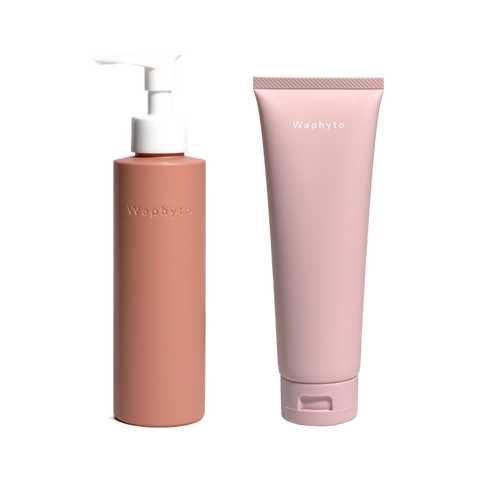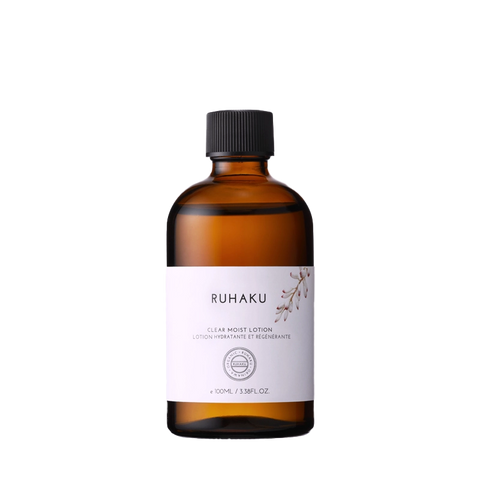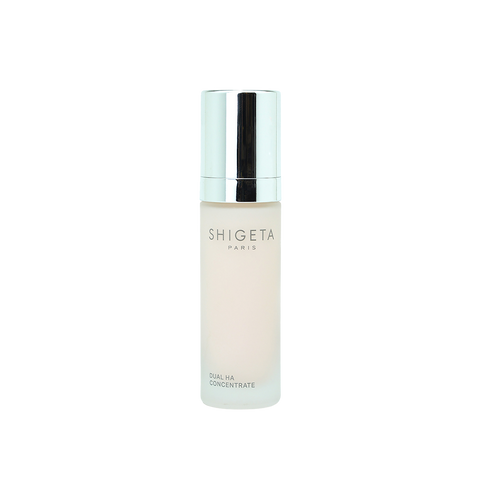Why your skincare routine can damage your summer skin
Author: Jenny Schadow, Co-Founder MAYUNO
TL;DR Is it possible to care for your skin the wrong way in summer?
In summer, many skincare products that otherwise ensure radiant skin can have the opposite effect. In hot and sunny weather, your skin needs specialised skincare: avoid or reduce the use of retinol or strong fruit acids, and instead use mild exfoliants and light moisturisers with hyaluronic acid and consistent UV protection. Instead of oils and rich creams for long-term use, most skin types now need lighter, water-based products.
What doesn't work in summer
Summer brings intense UV radiation, heat, sweat, dry air, chlorine or salt water and humid air – all of which stress our skin. It produces more sebum, is more quickly damaged by light and is prone to heat spots, uneven tanning or pigmentation spots. Many routine products from autumn and winter are also too heavy. You notice that you are over-treating your skin, for example due to shiny areas, clogged pores or sticky residues. If you continue to use exfoliants (e.g. peeling creams) or retinol without adjusting them, your skin may react sensitively, dry out or become irritated. It is essential to figure out what your skin needs right now – and what it doesn't.
Gentle rather than aggressive
Mechanical or strong chemical exfoliants (AHA/BHA) promote smoothness and evenness, but they make your skin more sensitive to the sun and particularly prone to irritation in summer.
If you still want to use an exfoliant, dermatologists recommend using a gentle enzyme exfoliant no more than 1-2 times a week. But be careful: immediately after exfoliation, the skin is particularly sensitive to UV rays, often feels drier and is more prone to irritation. It is therefore important to avoid direct sunlight right after use and to use a well-tolerated sunscreen. After exfoliating, it is best to rehydrate your skin with a water-based moisturiser. Minimalist formulations without irritating ingredients help to avoid further irritation of your skin barrier.
However, exfoliation is not necessary for daily cleansing. Japanese Double Cleansing, for example, allows you to thoroughly and gently cleanse your skin of oil-soluble and water-soluble substances.
Less is more
Retinol and high-dose vitamin C can renew your skin, but at the same time they can also make your skin more sensitive to light.
Retinol is currently a very hyped ingredient and is used as an ‘all-rounder’ for various purposes, from reducing acne to anti-aging. However, several studies have also shown that retinol thins the top layer of skin by accelerating skin renewal, making it more sensitive to UV-induced skin damage. It is therefore often recommended to use retinol with a sunscreen of at least SPF 30 and to apply the substance preferably as a night treatment.
Vitamin C supports the skin in repairing sun damage by protecting against free radicals and stimulating natural collagen formation. At the same time, it is also used in skin care for natural skin lightening, especially for dark spots, melasma and hyperpigmentation. To achieve this, vitamin C reduces melanin production, which is a natural UV protection. For this reason, it is recommended to combine any high-dose vitamin C product, with a concentration of 15% or more, with a really good sunscreen.
Even with daily sun protection, your complexion remains more susceptible. Those who are prone to pigmentation spots should pause active ingredient care in summer as a precaution and instead use milder products to achieve moisture and skin regeneration.
Adjust cleansing and moisturising instead of skipping them
During a warm day, dirt, oil and sunscreen accumulate on your skin, so cleansing in the morning and evening is a must. However, don't overdo it: aggressive cleansing can damage the skin barrier and cause adverse effects. Use gentle, sulphate-free cleansers with moisturising ingredients such as glycerine, ceramides or hyaluronic acid.
Another common mistake in summer is not moisturising the skin enough. Especially in hot weather, the skin often suffers from increased moisture loss and lipid deficiency. A good hydrating moisturiser can help here.
Avoid oils and heavy textures
Sun and dry air stimulate your sebaceous glands to produce noticeably more sebum. You can easily see this in the form of a shiny forehead, nose and chin. If you continue to use skincare products with winter textures or make-up with comedogenic oils or plant butters, this can clog your pores and subsequently lead to pimples and blackheads.
It should be noted that not every skin type reacts the same way to comedogenic substances. However, oily skin and skin prone to blemishes should tend to use non-comedogenic oils, such as jojoba oil or argan oil. While dry and mature skin needs a little more oil in its skincare routine in addition to plenty of moisture, even in summer. For all other skin types, it is beneficial to avoid rich water-in-oil care products (oily creams) in high temperatures and use lighter oil-in-water textures (milky lotions) instead. This allows the skin to breathe and reduces shine.
UV protection: essential
It's a dilemma: on the one hand, we need the sun to produce sufficient vitamin D, which is crucial for our immune system, our sleep patterns and our mood. On the other hand, the sun can cause premature ageing of the skin, skin damage and pigmentation disorders and hyperpigmentation.
To enjoy the benefits without the disadvantages, daily sun protection is therefore essential – through clothing, but also through sun cream, sun gel, sun lotion or sun spray. Even if it is cloudy, you are sitting in the shade or staying indoors: UV rays penetrate clouds and window glass – so protection is almost always a good idea.
It is important that the sunscreen covers a broad-spectrum – that means both UVA and UVB rays – and has a sun protection factor (SPF) of at least 30. As a rule of thumb, reapply every 2–3 hours, especially after swimming or sweating.
To avoid irritating your skin, it is best to choose light, breathable formulations and avoid comedogenic ingredients such as coconut oil, lanolin and mineral oil.
Finally, make sure to wash off your sunscreen thoroughly in the evening. The Japanese Double Cleansing method is best suited for this.
Conclusion
In Japanese tradition, beauty is cultivated through deceleration, mindfulness and minimalism. Especially in summer, less is more when it comes to skin care. Now is not the time for bombastic beauty routines, but rather to support your skin's balance with minimal, gentle products and light textures. If you actively take care of your skin and don't over-treat it, it will regulate itself. Quite naturally. For wonderfully fresh, youthful and healthy skin that makes you feel good.
FAQ
Frequently asked questions about skincare in summerRetinol accelerates skin renewal, making the skin thinner and therefore more sensitive to UV rays. For this reason, it should only be used in the evening during summer, if at all, and always in combination with a good sunscreen.
Experts also advise avoiding retinol altogether during pregnancy and breastfeeding as a precaution. Although the few studies conducted to date in which retinol was applied to the skin have not shown any significant risk of harm to newborns, there is a theoretical risk and, due to insufficient data, caution is advised.
You can use a gentle vitamin C serum in summer – preferably with a low concentration of around 5%. Just make sure to always combine this with sunscreen with a sun protection factor (SPF) of at least 30. You should avoid high-dose vitamin C products (10–20%) in summer, as they can promote pigmentation spots. If you do use them, do so carefully and selectively.
Compact or loose powders with sun protection factor (SPF) are based on the principle of mineral sun protection, whereby the active ingredients zinc oxide or titanium dioxide reflect UVA and UVB radiation. Powders are non-sticky, have a mattifying effect and can be a game changer, especially for oily skin. However, you should not rely exclusively on sun protection powder. Why? Compared to creams or lotions, powder is applied more unevenly and much more thinly. This raises the question of whether the stated sun protection factor (SPF) is actually achieved. For reliable sun protection, dermatologists therefore recommend combining SPF powder with a sun cream or lotion as a base.
If you wear make-up or sunscreen, then yes. A water-based cleanser alone cannot remove everything without leaving any residue. When Double Cleansing, just make sure that the oil cleanser and foam cleanser are mild and moisturising. Usually, it is sufficient to double cleanse once a day during your evening routine.
Oils are not necessarily wrong in summer, but they should suit your skin type. If you have very dry or sensitive skin, a drop of non-comedogenic oil in the evening can support your skin barrier. Otherwise, it is better to switch to lighter textures. If you sweat heavily or in high humidity, and especially if you have combination skin and a tendency to blemishes, the rule is: less oil = fewer problems.
That depends on your serum: many modern serums with moisturising ingredients are perfectly sufficient in summer – especially for oily skin. The decisive factor is how your skin feels after applying the serum. If it feels soft, moisturised and balanced, you don't need anything else. However, if your skin feels tight and dry, a light moisturiser may be useful.








